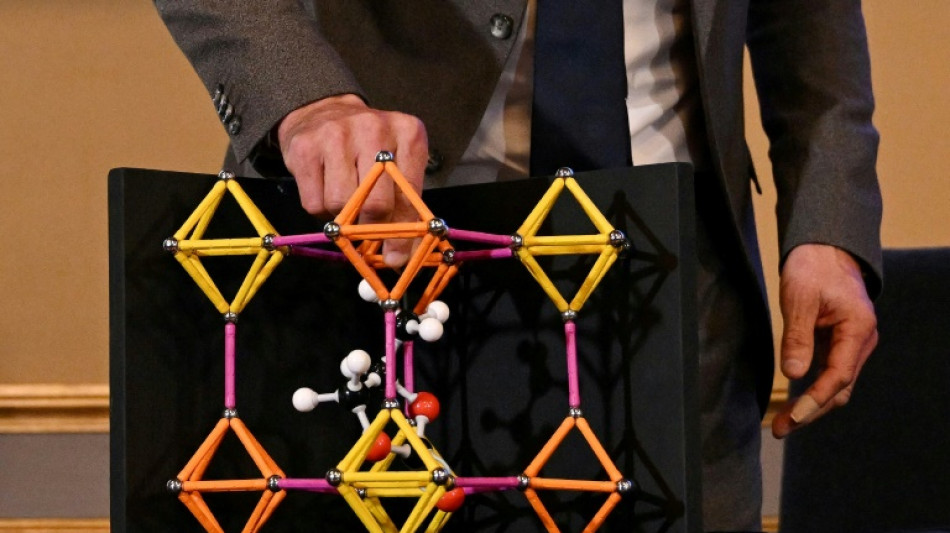
-
 Sorloth treble helps Atletico past Brugge into Champions League last 16
Sorloth treble helps Atletico past Brugge into Champions League last 16
-
Louvre president hands in resignation to Macron: Elysee
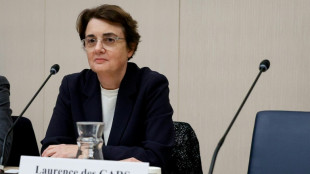
-
 Iran says deal 'within reach' ahead of US talks
Iran says deal 'within reach' ahead of US talks
-
Torrential rains leave 25 dead in Brazil, dozens missing

-
 Northeast US faces power cuts and school closures after snowstorm
Northeast US faces power cuts and school closures after snowstorm
-
US abstains in UN vote voicing support for Ukraine

-
 Lebanon fears Israeli strikes if Iran situation escalates
Lebanon fears Israeli strikes if Iran situation escalates
-
Trump seeks to strike back in crucial State of the Union

-
 World-class Brook played 'the best innings of his life' - Afridi
World-class Brook played 'the best innings of his life' - Afridi
-
US appeals WTO ruling in dispute by China over clean energy subsidies
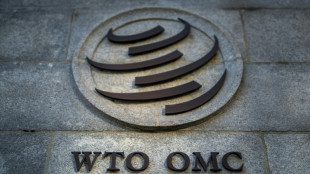
-
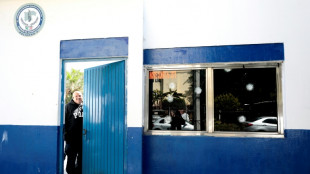 Guadalajara: World Cup host city rocked by narco violence
Guadalajara: World Cup host city rocked by narco violence
-
Briiliant Brook 100 puts England into T20 World Cup semi-finals

-
 Germany's Merz heads to China for talks centred on trade
Germany's Merz heads to China for talks centred on trade
-
Briiliant Brook 100 puts England into T20 World Cups semi-finals

-
 Warner Bros. 'reviewing' new takeover bid from Paramount
Warner Bros. 'reviewing' new takeover bid from Paramount
-
US told EU it 'stands' by tariff deal: trade chief

-
 Torrential rains leave 23 dead in Brazil, dozens missing
Torrential rains leave 23 dead in Brazil, dozens missing
-
UK govt says will release files on 'rude' ex-prince Andrew

-
 Nearly an own gull! CPR performed on bird at Turkey football match
Nearly an own gull! CPR performed on bird at Turkey football match
-
How AFP has used data analysis to cover the Ukraine war
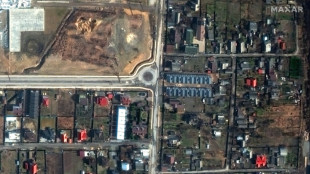
-
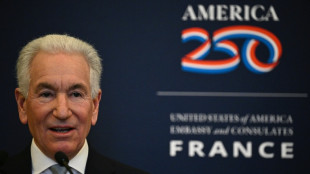 Paris says US envoy pledges not to 'interfere' in France affairs
Paris says US envoy pledges not to 'interfere' in France affairs
-
Iran says students must respect 'red lines' after protests

-
 Italian biathlete Giacomel has heart surgery after Olympic withdrawal
Italian biathlete Giacomel has heart surgery after Olympic withdrawal
-
Gazans salvage ancient books in mosque library damaged by war

-
 Farhan scores 63 as England restrict Pakistan to 164-9
Farhan scores 63 as England restrict Pakistan to 164-9
-
Stocks bounce as traders assess AI fallout, tariffs

-
 Brazil court tries politicians over hit on Black councilwoman
Brazil court tries politicians over hit on Black councilwoman
-
Senegal PM vows to double penalty for same-sex relations

-
 UK govt backs releasing documents tied to 'rude' ex-prince Andrew
UK govt backs releasing documents tied to 'rude' ex-prince Andrew
-
Novo Nordisk to slash prices of weightloss drugs in US

-
 Welllage says Sri Lanka can rescue T20 World Cup campaign
Welllage says Sri Lanka can rescue T20 World Cup campaign
-
UK's royal protection officers urged to speak up in Epstein probe
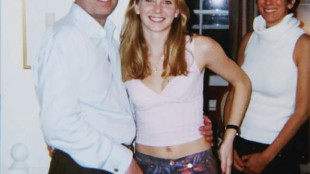
-
 Aid groups petition Israel's top court to halt ban on Gaza, West Bank ops
Aid groups petition Israel's top court to halt ban on Gaza, West Bank ops
-
UEFA can make fight against racism more than a slogan: Real Madrid's Arbeloa

-
 Bali flooding prompts tourist evacuation: official
Bali flooding prompts tourist evacuation: official
-
Jones says Borthwick's 'title-decider' comments behind England collapse

-
 UK fines Reddit nearly $20 mn over children's data failures
UK fines Reddit nearly $20 mn over children's data failures
-
PSG star Hakimi faces trial for alleged rape

-
 Netflix, Prime and Disney+ face UK broadcasting regulation
Netflix, Prime and Disney+ face UK broadcasting regulation
-
Greece set new tourism record in 2025

-
 Zelensky says Ukraine unbroken after 4 years, but Russia vows to fight on
Zelensky says Ukraine unbroken after 4 years, but Russia vows to fight on
-
Zelenksy says Ukraine unbroken after 4 years, but Russia vows to fight on

-
 Snoop Dogg 'can't wait' for first Swansea visit
Snoop Dogg 'can't wait' for first Swansea visit
-
Stocks fluctuate as traders assess AI fallout, tariffs

-
 Post-it maker 3M faces Belgian trial over 'forever' chemicals
Post-it maker 3M faces Belgian trial over 'forever' chemicals
-
UK comedian Russell Brand pleads not guilty to new rape, assault charges

-
 Duterte drew up 'death lists', boasted about murders: ICC prosecutor
Duterte drew up 'death lists', boasted about murders: ICC prosecutor
-
UK govt urged to release documents linked to ex-prince Andrew

-
 Rights group slams treatment of viral Japanese monkey
Rights group slams treatment of viral Japanese monkey
-
Inside the bunker where Zelensky led response to Russian invasion
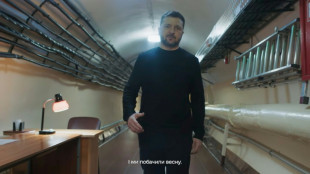

'Solids full of holes': Nobel-winning materials explained
The chemistry Nobel was awarded on Wednesday to three scientists who discovered a revolutionary way of making materials full of tiny holes that can do everything from sucking water out of the desert air to capturing climate-warming carbon dioxide.
The particularly roomy molecular architecture, called metal-organic frameworks, has also allowed scientists to filter "forever chemicals" from water, smuggle drugs into bodies -- and even slow the ripening of fruit.
After Japan's Susumu Kitagawa, UK-born Richard Robson and American-Jordanian Omar Yaghi won their long-anticipated Nobel Prize, here is what you need to know about their discoveries.
- What are metal-organic frameworks? -
Imagine you turn on the hot water for your morning shower, David Fairen-Jimenez, a professor who studies metal-organic frameworks (MOFs) at the University of Cambridge, told AFP.
The mirror in your bathroom fogs up as water molecules collect on its flat surface -- but it can only absorb so much.
Now imagine this mirror was made of a material that was extremely porous -- full of tiny holes -- and these holes were "the size of a water molecule," Fairen-Jimenez said.
This material would be able to hold far more water -- or other gases -- than seems possible.
At the Nobel ceremony, this secret storage ability was compared to Hermione's magical handbag in Harry Potter.
The inside space of a couple of grams of a particular MOF "holds an area as big as a football pitch," the Nobels said in a statement.
Ross Forgan, a professor of materials chemistry at the University of Glasgow, told AFP to think of MOFs as "solids that are full of holes".
They could look essentially like table salt, but "they have a ridiculously high storage capacity inside them because they are hollow -- they can soak up other molecules like a sponge."
- What did the Nobel-winners do? -
In the 1980s, Robson taught his students at Australia's University of Melbourne about molecular structures using wooden balls that played the role of atoms, connected by rods representing chemical bonds.
One day this inspired him to try to link different kinds of molecules together. By 1989, he had drawn out a crystal structure similar to a diamond's -- except that it was full of massive holes.
French researcher David Farrusseng compared the structure of MOFs to the Eiffel Tower. "By interlocking all the iron beams -- horizontal, vertical, and diagonal -- we see cavities appear," he told AFP.
However Robson's holey structures were unstable, and it took years before anyone could figure out what to do with them.
In 1997, Kitagawa finally managed to show that a MOF could absorb and release methane and other gases.
It was Yaghi who coined the term metal-organic frameworks and demonstrated to the world just how much room there was in materials made from them.
- What can they do? -
Because these frameworks can be assembled in different ways -- somewhat like playing with Lego -- companies and labs around the world have been testing out their capabilities.
"This is a field that's generating incredible enthusiasm and is moving extremely fast," Thierry Loiseau of French research centre CNRS told AFP.
More than 100,000 different kinds have already been reported in scientific literature, according to a Cambridge University database.
"Every single month, there are 500 new MOFs," Fairen-Jimenez said.
He and Forgan agreed that likely the greatest impact MOFs will have on the world are in the areas of capturing carbon and delivering drugs.
Though much hyped, efforts to capture carbon dioxide -- the driver of human-caused global warming -- have so far failed to live up to their promise.
Forgan said he was once "a bit sceptical about carbon capture, but now we're finally refining (the MOFs) to the point where they are meeting all the industrial requirements".
Canadian chemical producer BASF says it is the first company to produce hundreds of tons of MOFs a year, for carbon capture efforts.
And Yaghi himself has demonstrated that a MOF material was able to harvest water vapour from the night air in the desert US state of Arizona.
Once the rising Sun heated up the material, his team collected the drinkable water.
D.Cunningha--AMWN



